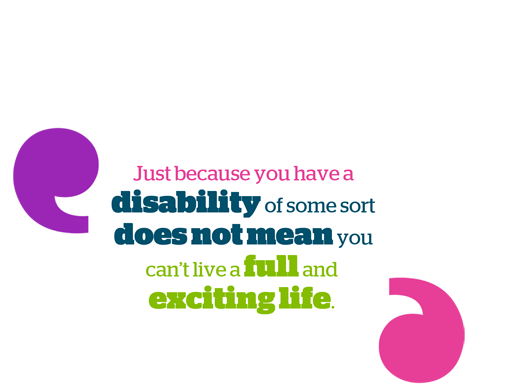Young people with disabilities are exactly the same as young people without disabilities, however, having a disability could mean you are unable to do the things that other people can do. You may face more challenges, but life can still be as fun and full of achievement.
"Being a teenager can be a tough time, sometimes it’s even harder with a disability."
Everyone wants to fit in and it can be easy to feel you are alone. Remember you don’t have to go it alone - there’s loads of support, practical and financial help out there for you. This can be an exciting time. Up until now, your parents have probably made all your decisions - now you can start to make some choices for yourself. Whether you’re at a special needs, mainstream school or college, a good education can improve your chances later in life, education is important for everyone. Just because you have a disability of some sort does not mean you can’t live a full and exciting life.
In healthcare, the word ‘transition’ is used to describe the planning, preparing and moving on from children’s healthcare to adult healthcare. It’s a gradual process and gives everyone time to talk about what healthcare you will need as an adult, choose which adult hospital or services are best for you and make sure you are ready for the move.
Most young people move on to an adult hospital and adult hospital services between 16 and 18 years old. Sometimes, young people move from a children’s hospital to an adolescent unit at 13 or 14 years old, instead of moving straight to an adult hospital. You can ask the consultant or clinical nurse specialist about when you will be making the move.
Young people will be given a lot more independence, where appropriate and will be encouraged to learn about their condition, so that they can be more involved in their care and decision making and take responsibility for their medicines.
Try to keep a list of important emergency telephone numbers. You may find an ‘Alert’ bracelet useful, if you have a condition that may change suddenly.
Think about making your own appointments. At the adult service, during appointments or admissions, doctors, nurses and other staff will spend more time talking to the young person than their parents, although they are still encouraged to attend the appointments.
If you are not able to make your own decisions after the age of 16 talk to your personal adviser or social worker for advice on mental capacity and the role of deputyship in regards to health matters.






